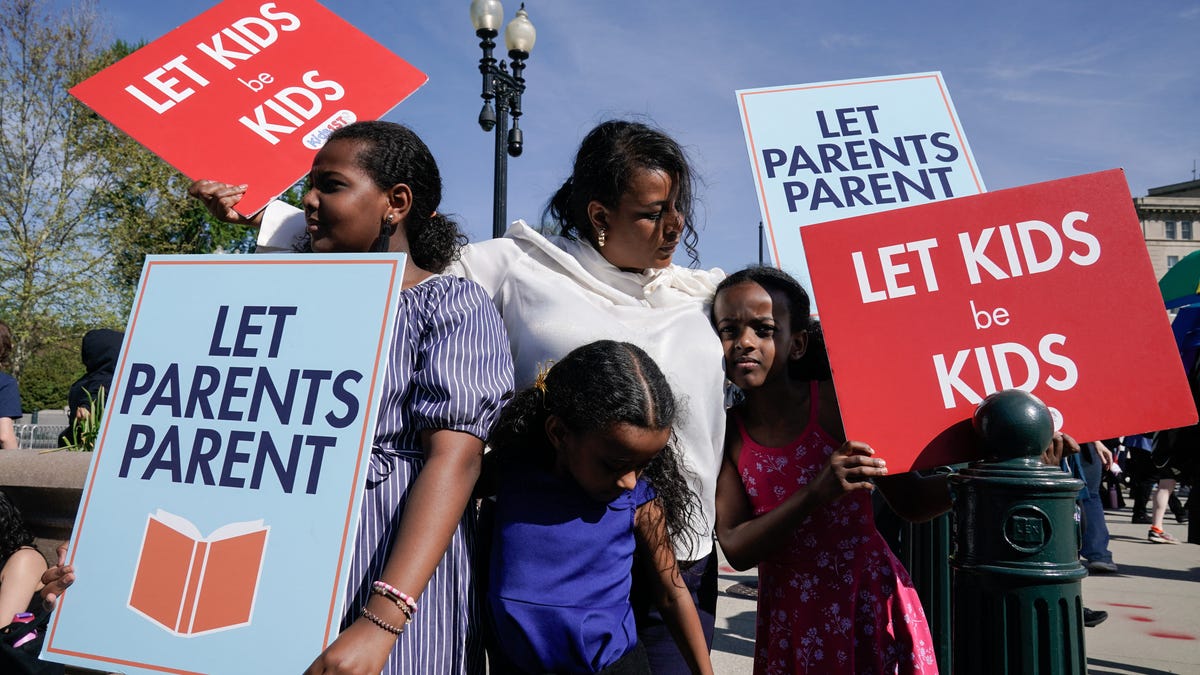Parents say the storybooks are being used to teach ideas about gender and sexuality that go against their religion.
SCOTUS considers Planned Parenthood defunding case amid protests
Pro and anti-abortion protesters lined up outside the Supreme Court in Washington D.C., as the justices heard a Planned Parenthood defunding case.
WASHINGTON – It was clear that the Maryland school district using LGBTQ+ characters in its elementary school reading program faced an uphill battle before the Supreme Court on Tuesday even before Justice Neil Gorsuch brought up bondage.
A shocked Gorsuch said that in one of the books – the alphabet primer “Pride Puppy in which children chase their dog through a pride parade – students are “supposed to look for the leather and bondage and things like that.”
Alan Schoenfeld, an attorney for the Montgomery County School District, said there’s no bondage in the book – which has since been pulled from the schools – and the leather refers to a woman’s leather jacket.
But he’d already appeared to have lost the court’s conservative supermajority.
Most of the justices sounded sympathetic to a group of Maryland parents who want their elementary school children excused from class when the books are being read.
The Christian and Muslim parents say the storybooks are being used to teach ideas about gender and sexuality that go against their religion.
“You have children of an extremely young age being indoctrinated in a topic that’s known to be sensitive,” said Eric Baxter, an attorney with the Becket Fund for Religious Liberty which is representing the parents.
Officials in the school district that added the books to its reading program say exposing students to ideas that clash with their parents’ religious beliefs does not violate their constitutional rights.
“Every day, in public elementary school classrooms across the country, children are taught ideas that conflict with their families’ religious beliefs,” said Alan Schoenfeld, the attorney representing the Montgomery County School District, one of the nation’s largest and most ethnically and religiously diverse districts.
If the court finds parents have a First Amendment right to object every time that happens, he said, judges will be swamped with “an infinite variety of curriculum challenges.”
Book dispute is one of three religious rights cases
The case is one of three religious rights cases the Supreme Court is deciding in the coming weeks, and appears likely to be part of a recent trend of the court siding with religious rights advocates.
The controversial books include “Prince & Knight,” in which the handsome prince falls in love not with a princess, but with the knight who helps him defeat a dragon.
In “Uncle Bobby’s Wedding,” Chloe’s favorite uncle gets married to another man.
The book “Intersection Allies” features nine kids from different backgrounds, including Alejandra who uses a wheelchair while playing basketball; Adilah who wears a hijab in ballet class; and Kate, who prefers a superhero cape to “skirts and frills.”
Conservative justices sound sympathetic to parents
Chief Justice John Roberts pushed back on the district’s claim that students aren’t required to believe any of the ideas promoted in the books.
“Is that a realistic concept when you’re talking about a five-year-old?” he asked.
Justice Samuel Alito said “Uncle Bobby’s Wedding” has a “clear moral message.”
“Maybe it is a good message,” Alito said. “But it’s a message that a lot of people who hold on to traditional religious beliefs don’t agree with.”
Justice Brett Kavanaugh said he didn’t understand why the school discontinued allowing students to opt out of hearing the book read in class.
“The whole goal, I think, of some of our religion precedents, is to look for the win-win,” he said, “to look for the situation where you can respect the religious beliefs and accommodate the religious beliefs while the state or city or whatever it may be can pursue its goals.”
Schoenfeld, the attorney for the district, said the number of opt-out requests – dozens in one elementary school – became too difficult to administer. Teachers struggled to find enough space, supervision and alternative instruction for those students, he said.
Justice Amy Coney Barrett questioned the district’s defense that the books are being used to promote respect for others and to show that the world is diverse. She said the instructional guidance included with the books are less “about communicating respect for those who are transgender, who are gay, and more about how to think about sexuality.”
`Opt-outs for everyone’?
As the court’s conservative supermajority grilled the school district during the approximately two-and-a-half hours of oral arguments, the three liberal justices tried to poke holes in the parents’ arguments.
Justice Elena Kagan said that while she was “struck” by the content of the books for young students, the parents are asking the court to allow opt-outs for anything they object to.
“Once we say something like what you’re asking us to say, it will be like opt-outs for everyone,” Kagan said.
Justice Ketanji Brown Jackson said parents who object can homeschool their children or send them to private school.
“You have a choice. You don’t have to send you kid to that school,” she said.
But Sarah Harris, the Justice Department attorney who helped defend the parents’ position, said the county has put price on public education at the expense of parents forgoing their religious beliefs.
Dueling demonstrations outside the court
Outside the court, Grace Morrison, a Catholic mother, said she had not choice but to homeschool who daughter even though that meant spending tens of thousands of dollars because of her daughter’s special needs.
“The school board has taken away my family’s ability to raise her according to our faith,” she said.
Steps away, people supporting the use of the books in the school – some wrapped in rainbow flags — waved signs urging the justices to “Protect Inclusive Education”
A decision in Mahmoud v. Taylor is expected by summer.
